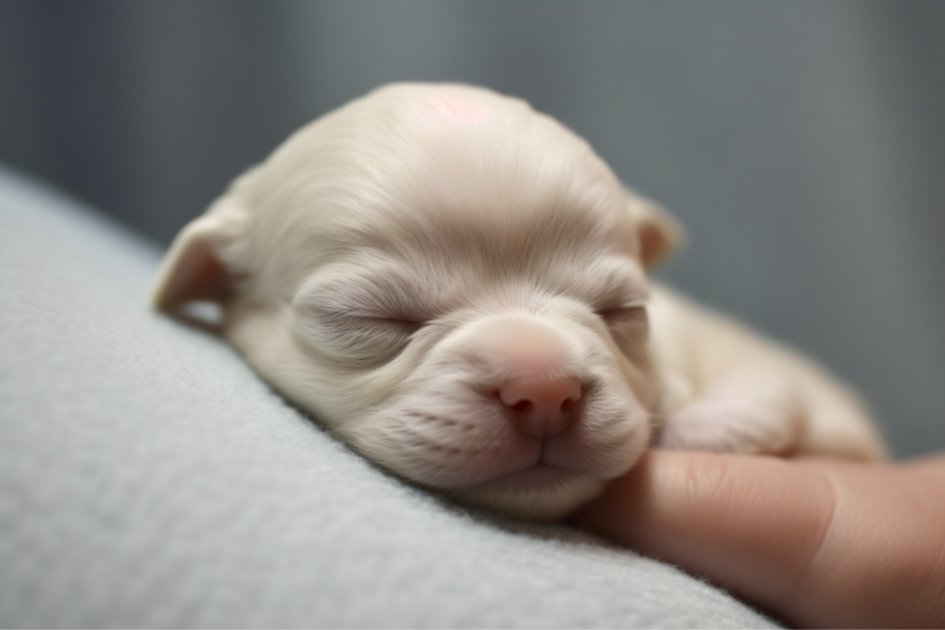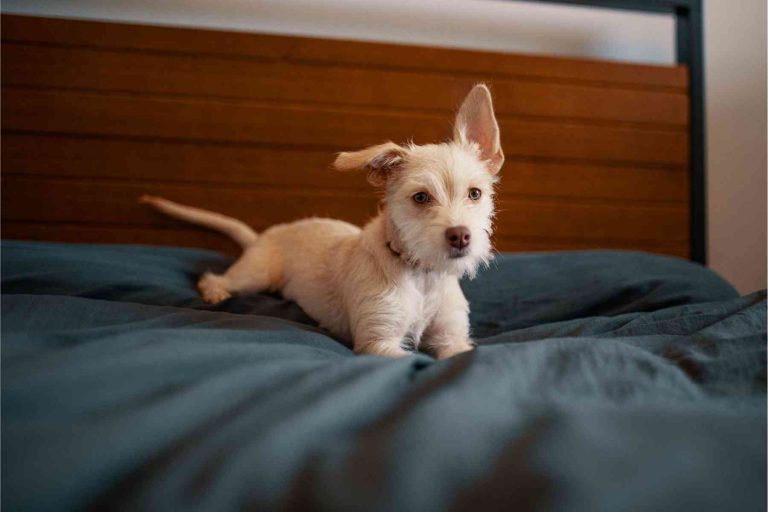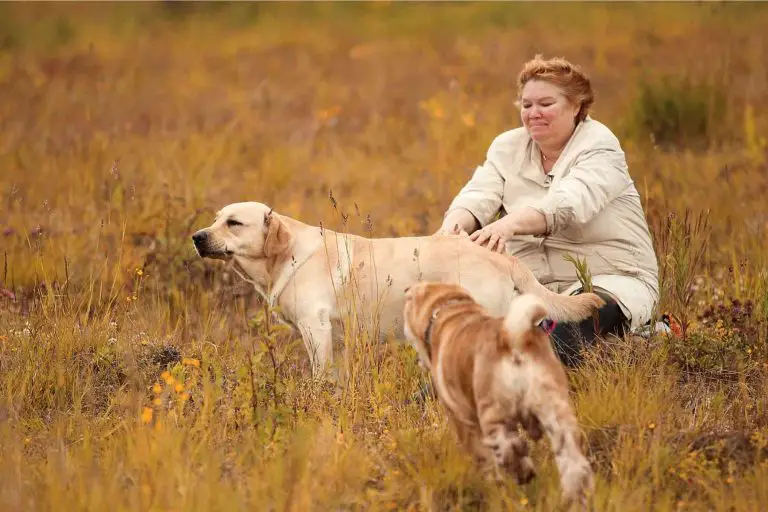When Do Puppies Open Their Eyes? (When Can They See?)

Bringing a new puppy into your home is an exciting time, filled with many milestones and developmental changes. Among the most fascinating developments is the opening of a puppy’s eyes. At birth, puppies are unable to see, leaving many new pet owners curious about when they can expect their precious pup to finally open its eyes and begin exploring its surroundings.
Puppies typically open their eyes around two weeks of age, but this can vary depending on the breed and individual puppy. Larger breeds may take slightly longer than smaller breeds, for instance. While most puppies open their eyes between 10 to 14 days of age, it is not uncommon for some puppies to take up to 18 days to fully open their eyes. It is important to remember that these timelines should serve only as guidelines, and it is not unusual if a puppy opens its eyes slightly earlier or later than the average time frame.
When a puppy’s eyes do open, pet owners should take note that their vision is still developing and continues to improve as the puppy grows. Initially, puppies’ vision is blurry and they might be sensitive to bright lights. As they navigate their new world with open eyes, they will rely on their sense of smell and touch to help make sense of their surroundings. Monitoring your puppy’s eye-opening process and early vision is crucial for identifying any potential problems and ensuring a healthy development.
When Do Puppies Open Their Eyes?
Puppies, just like most mammal newborns, are born with their eyes closed. The process of eye opening varies slightly among different breeds, but in general, their eyes will open within the first two weeks of life. This section will explore the different stages and rates at which puppies’ eyes open, with a focus on the variations among dog breeds.
Birth to Two Weeks
Most puppies will begin to open their eyes between 10 and 14 days old. During this early stage, their sight is still undeveloped and may be sensitive to light. It’s important to keep the environment dim and comfortable for the puppies to prevent any unnecessary exposure to bright light, which can stress them and affect their visual development.
As the puppies’ eyes start to open, they will gradually adjust to their surroundings and become better at focusing on objects nearby. It is important to give them time to adjust to their new sense of sight by not overwhelming them with loud noises or sudden movements in their vicinity. A calm and nurturing environment is key to a smooth transition during this period.
Different Rates Among Dog Breeds
Although most puppies open their eyes within the same general time frame, there can still be variations among different dog breeds.
It’s a well-known fact that small breed pups are the early birds when it comes to opening their peepers. And why is that, you ask? Well, it could be because these little furballs are just too quick for their own good, developing at lightning speed compared to their larger counterparts.
The rate at which a puppy’s eyes open can also be impacted by factors such as genetics and environmental conditions. Some individual puppies may open their eyes more quickly or slowly than others within their breed due to a hereditary predisposition. Additionally, factors like temperature, humidity, and the overall health of the puppy can play a role in the eye-opening process.
Monitoring the puppies within the first few weeks of life will provide insight into their eye-opening progress, as well as any potential issues that may need the attention of a veterinarian. It is crucial to ensure that the puppies are growing and developing at a healthy and appropriate pace, but it’s important to remember that some variations in the eye-opening timeline are normal and not a cause for concern.
Development of Vision and Hearing
Puppies undergo significant vision and hearing development during their early weeks of life. This process is crucial as they rely on these senses to navigate their world and communicate with their mother and littermates.
Eyesight Development
At birth, puppies are born with their eyes closed and have limited vision. This is because their optical nerves and retinas are not fully developed yet. As they grow, their eyesight gradually improves. By the time they are around two weeks of age, they will start to open their eyes for the first time. This marks the beginning of their eyesight development process.
Initially, a puppy’s vision is blurry, which makes it difficult for them to see details or properly discern objects.
A puppy’s eyes will become more sensitive to light as they develop, and their overall vision will continue to improve throughout the first few months of life. However, it is essential to avoid exposing them to too much bright light or loud noises as their sense of sight and hearing are still developing and could be easily overwhelmed.
Opening of Ears
Puppies are born with their ear canals closed, which means they are deaf at birth. The opening of the ears typically occurs between 2 to 3 weeks of age. This is a crucial period in a puppy’s development, as it marks the beginning of their ability to hear sounds and properly respond to their mother or environmental stimulants.
Once the ears fully open, the remaining auditory structures continue to mature, and a puppy’s hearing abilities begin to develop fast. By the age of four weeks, puppies can usually hear soft sounds and begin to respond to familiar voices.
It is crucial not to expose young puppies to loud noises during this sensitive time, as doing so can have an adverse impact on their hearing development. Instead, provide a calm and controlled environment to protect their sensitive ears.
In conclusion, the development of a puppy’s vision and hearing is a complex process that occurs in their early weeks and months of life. It is critical for pet owners to understand the importance of providing an optimal environment to ensure proper sight and auditory development in their puppies, which will contribute to their overall well-being and quality of life.

Caring for Newborn Puppies
Newborn puppies require special attention and care to ensure they are healthy and develop properly. One of the most significant milestones in a young puppy’s life is the opening of its eyes. In this section, we will discuss how to care for newborn puppies, including feeding, weaning, socialization, and training.
Feeding and Weaning
Proper nutrition is essential for newborn puppies as it affects their overall health and development, including the opening of their eyes. A mother dog will typically nurse her puppies for at least the first three to four weeks of life. During this time, the mother’s milk provides all the necessary nutrients to support their growth and immune system.
At around four weeks of age, puppies may begin the weaning process. Start by introducing puppy food, gradually increasing the solid food provided while decreasing nursing sessions. This slow transition ensures that the puppy’s digestive system can adapt accordingly. By seven to eight weeks, puppies should be fully weaned and have grown their teeth, allowing them to consume a proper diet of solid puppy food.
Socialization and Training
Puppies begin to open their eyes around two weeks of age, although it may vary depending on the breed. For example, a Fox Terrier puppy may open its eyes later than most other breeds. Once their eyes are open their other puppy senses start to develop too.
Begin basic obedience training once the puppies have gained the ability to see and are comfortable walking. A well-socialized and trained puppy will grow into a well-adjusted adult dog, reducing any potential behavioral problems and ensuring a harmonious relationship between the pet and its owner.
Regular health checks are crucial during this development period. Keep an eye out for any signs of eye infections, such as swelling, discharge, or pus. Consult a veterinarian promptly if any unusual symptoms arise.
Potential Eye Issues
Puppies’ eyes are delicate, and it is important to monitor them as they develop. This section discusses potential eye issues, signs of problems, and when to consult a veterinarian.
Signs of Eye Problems
As puppies’ eyes open and develop, it’s essential to watch for signs of eye problems. Common indicators include:
- Excessive discharge or tearing
- Redness or swelling around the eyes
- Cloudiness or change in eye color
- Sensitivity to light
- Pawing at the eyes or excessive blinking
These signs may suggest an infection, injury, or other underlying issue that requires further assessment.
When to Consult the Veterinarian
If you notice any signs of eye problems in your puppy, it’s important to consult your veterinarian promptly. Early intervention can make a significant difference in protecting your puppy’s vision and overall health. Schedule a visit with your veterinarian if you observe:
- Persistent or worsening symptoms
- Discomfort or pain
- Behavioral changes, such as lethargy or appetite loss
Your veterinarian can evaluate your puppy’s eyes and recommend appropriate treatment, ensuring that your furry friend grows up with healthy vision and a good quality of life.






